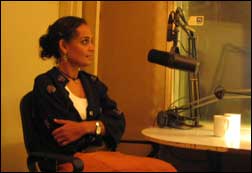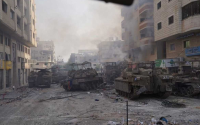20 June 2005
Omer Madra: Welcome Ms. Arundathi Roy, I can’t really express how happy we feel to have you here with us.
Arundhati Roy: Thank you, I’m very happy to be here.
OM: We should perhaps start with World Tribunal Iraq, Istanbul session. One of the most important issues concerning WTI is apparently the question raised by some people asking why there is no defence platform allocated in the Tribunal for President Bush and British PM Blair. We’ve heard some people claiming that it’s not a “just” attitude, and that the legal principle of “equality of arms” will not have been observed, etc. Could you elaborate on this as the spokesperson of the Jury of Conscience?
ARUNDHATI ROY: Well, you know, I don’t suppose we need black satire anymore when ideas like this are being floated. The idea that Mr. Bush and Mr. Blair don’t have a platform for their own defence or the idea that they’re outmaneuvered or outnumbered... I wish all that were true. But the fact is, I think that today we live in a world where all these institutions, whether it’s the mainstream media, whether it’s all these sort of corporate owned instutitions of democracy today. I mean, democracy is increasingly beginning to mean a sort of corporate market world. All these are at their command.
And what I would say this tribunal is trying to do is actually to mount a defence. It is the defence. It is trying to make a space that, these voices are gradually being squezeed out of. And I don’t think we need to pretend that we have not being bombarded by arguments for the war, or justifications for the war in Iraq. It is really the other side of the argument which has been given absolutely no space. And that is what this tribunal is trying to do. We know their arguments. Everybody knows their arguments. Everybody knows the lies. So this is really trying to make a space for a saner, different point of view.
And let it be said that, none of these arguments can stand up if they are hollow, if they are false or if they’re not based in fact. Because, arraigned against this tribunal, is all the money, all the weapons, all the media of the world. So we’re just trying to make a little bit of space for the other point of view. It’s not an attack, it is the defence.
OM: Now, from there we could move to a very “simple” question maybe. Where do you think the world is heading?
ROY: I wonder if it would be in one direction. I don’t think so. In a way, the problem is that it’s being pulled apart in different ways. If I had to put my finger on one simple answer to that question, it would be that historically human civilization has seen other empires. This is not first one you know. Other empires have come and gone. Empires have broken apart because of overreach, over stress ... It is almost the physics of power that causes that kind of implosion. But the one thing that is new is, that empires did never had the kind of weapons that could destroy the world in an afternoon, that could take every living thing in this world down with it in an afternoon. And I think that is really the threat that we’re up against – that basically, human intelligence has outstripped the human instinct for survival. When the tsunami happened human beings had lost the intelligence to able to predict what was coming. But no wild animals died. Not one single wild animal died. So, what we think of as civilization and achievement may just be the opposite.
OM: To that maybe we could add the recent knowledge we had after the tsunami: That, in the Andaman Islands the so-called “primitive” people, those ancient hunter-gatherers, also survived, totally survived... just like the wild animals did...
AR: Because their instincts have not been kind of messed about with technology. I mean I don’t mind to sound like some kind of techno-phobe, but I’m just saying that, we are losing something, while we think we are gaining something. We are losing one kind of intelligence while gaining another. It’s not that we are not paying a huge price.
OM: To that huge threat of weapons of mass destruction, primarily that of nuclear weapons, could we also add something equally threatening – namely, the prospect of global climate change, and global warming? We’ve been reading from recent reports that the US goverment is distorting all kinds of scientific evidence to that effect, just to “prove” that global warming has no connection with human activities, and so on.
AR: Well I think, in this quest for complete hegemony, is the loss of an idea of history as well as a loss of an idea of the future. The power has to be consolidated now, and today. So it’s climate change, it’s the notion of ”full spectrum dominance” including the militarization of space, it’s the manipulation of all information. Today, I think the largest bank of information lies with organizations like the World Bank who have generated that information to suit themselves. Research is conducted by pharmaceutical companies to suit themselves, medical research, everything is manipulated. And of course the media is, too. So, we live in a ... I remember once talking to somebody who was a paranoid schizophrenic, who said that when she looked in the mirror the most terrifiying thing for her was that she didn’t see herself in the mirror. She saw someone else, someone monstrous. And I remember thinking how can you deal with that? Today whether it’s in America, or whether it’s in India – and I’m sure whether it’s in Turkey – when you read the newspapers, when you see TV, when you got out on the street and you see the electronic images that are beamed out at you ... You get the sense that this whole thing which was supposed to be a mirror of the society you live in is entirely false now. It’s a false and hyper-reality. It’s exactly like being a paranoid schizophrenic. You look in the mirror of the world you think that you inhabit and what you see is a different world – a world of botox and ... all false information. You go to a place like say, Kashmir in India and you see for yourself what is happening. Then you read the Indian national newspapers. And there is no resemblance between what is happening and what they say is happening. In any issue this is the case. It’s like having to hold this two incompatible realities. Because you cannot any longer say what is happening on TV is real or more real than what is really happening. Because we have to live in these fractured levels of reality now.
OM: I remember reading one of Oliver Sacks’ books. There was a small footnote. See, in a mental institution where autistic people are being treated and rehabilitated, they have this TV in front of them. One of the American Presidents, perhaps Nixon, is delivering a serious speech on current US and world affairs ... Professor Sacks suddenly observes that all the autistic patients, about a dozen of them, are all laughing like crazy. Every single one of them laughing, without exception. Dr. Sacks cannot make it out. He conducts these interviews with the patients to find out the reason. Finally, he discovers that you can never lie to an autistic person. And that was why they were laughing – they were laughing because the talking head, their President, was lying to them... Now, in these times, one has this feeling that we find ourselves in a kind of “autistic” situation. Would you comment on that?
AR: I think that it does drive you to a place of ... Autism, I imagine, is a result of some kind of very deep trauma. And we are in a situation of very deep trauma. Because you are living in a place, where gradually the exits are being sealed and you don’t know what to do. The fact is, in a country like India, which today is being kind of marketed as the “coolest” place, you know it’s just “everything about India is cool”. Thomas Freedman says the world is flat. But look at India, look at the corporations, look at the ‘poor’ Indian corporates, who are doing so well... And meanwhile, you see the poor being stuffed like lice into the crevices of the city, yo know they’re sleeping in pipes and cracks and drains, and wherever you look. For your own sanity you have to find a filter to not see that. To remain in that position you have to be insane, to survive you have to be insane. Ultimately, how do you live with it? How does a villager in Kashmir live with the constant humiliation of being searched, of being asked for their identity, of not knowing when they are going to be picked up and killed or tortured? You know, they’ve just internalized a life of humiliation. But it does have serious psychological implications. In many ways even those of us who think we’re not being humiliated are being humiliated on a daily basis. Humiliated into being forced to concede to the lies eventually. Because to carry on saying what you are saying in the face of this kind of propaganda which works at so many levels. ... Primarily the appropriation even of the idea of joy. That’s also there isn’t it? I mean the ads, the music, the writing, the bookshops, the films, everything needs to be fueled by money and the money is all on that side, not on this side anymore. So at some point somebody has to buy into that...
OM: So everything is sort of branded...
AR: Yeah, the point is that there are places where you almost need to be insane to actually break out of that stranglehold and see if there is another way of being, if there is another way of looking at things, there is another way living... But that means redefining everything about what you want. That means really walking away from all these things that are baubles, and glitter, and everything that’s been dangled at you. If you look at what’s happening in a country like India, it’s so frightening because I think perhaps one of the greatest threats facing it is what I call the ‘NGOisation’ of politics. We have this hugely funded NGOs mostly funded by the very institutions that are causing the goverment to pull back on public funding. And anybody who shows any kind of spark, any kind of political understanding is corrupted by that NGO. So it’s a situation... it’s like this big vacuum-cleaner, you know, just picking up anything that puts his head up above a certain level. It’s a very sophisticated machine that is at work now, and to see it is almost to be crazy.
OM: It’s all probably related with the very root of the problem of power. I mean, you’ve written extensively on the search to understand, to explore and to display the mechanism of power which lies at the centre of our very lives. But still, don’t you feel, sometimes at least, powerless against such a huge accumulation of power?
AR: Obviously you feel powerless... I mean powerless because you’re watching this incredibly sophisticated machine at work.You’re being able to understand it and yet you can’t ... I mean there are also no pristine positions to take anymore. Nothing about your personal life, nothing can be pristine anymore. I know that even the royalties from my political writing that come in after paid taxes which are then used for making nuclear bombs, and big dams, and killing people, and so on. I do not ever claim to act from a position of pristineness. But I think it’s very important to understand what power and powerlesness are as well. I think basically there are always two kinds of people: People who have a comfortable relationship with power, and people who are naturally adversarial with power. This obviously applies to the totally powerless. None of us who belong to the middle class ... even, for example, access to language is a kind of cultural capital. So we cannot ... I cannot pretend to be powerless. It will be false of me to pretend to be powerless. For example, this is first time I’ve come to Turkey and it’s very interesting to look at this kind of establishment, power establishment here. The power establishment here is sort of secular, fundamental secular. The power establishment in India is essentially non-secular. Even if it’s the Congress [Party]. And that had been shifted quite decisively by the ten years or so BJP, the Hindu right-wing power. But, while here you might have a debate where people are being forced not to wear scarves on their heads, there it will be the opposite. Where people are being forced into positions of expressing religion, but the whole notion is not actually the scarf or the national costume, or the flag. It’s how do you express your power. Whether it’s by legislating on what people can wear and what people can’t wear, or whether it’s being able to legislate that, “OK today I’m going to build this dam and 30 million people or 20 thousand people, or how many people are going to be displaced because I say so.” It’s an exercise of state power. The way to understand it is not to look at those issues separately but understand the notion of power itself – to look at that. What are the passions that ignite human beings? How does it work? I think those are very fascinating questions. When is the time to stand together with a majority of people? When is the time to say that majority is wrong, and I don’t care if every opinion poll says this but I don’t agree. There are separate times when you have to take those separate positions. Because today everything is a subject of an opinion poll. And, one of the dangers of democracy is that it very easily shapes into majoritarianism ... Which then very easily shapes into a kind of fascism.
OM: And the very essence of democracy, perhaps, is the protection of the rights of minorities...
AR: But, actually if you look at it structurally, that is the very thing that’s been eroded unless the minority is a class elite. Because today what has happened to democracy? In the 70s and 80s America was toppling democracies all over the place...Latin America was threatened by democracy ... Today [America] is promoting democracy. Because they have learned how to empty it of meaning. They have learned how to subvert every democratic institution. So, democracy is good because it is not really democracy anymore. It’s the new world’s whore. (laughs). So, in India you see how clearly democracy works towards actually dividing people, [...] pitting one community against the other... In this kind of representative democracy, this is the nature of it. It is really very very terriffying. If you look at what happened in Gujerat in 2003, where – backed by Hindu right-wing goverment, backed by the police, backed by the administration – mobs rampaged through Muslim lives, killed 2000 people, gang-raped women on the streets, burned them alive, drove hundred thousand people from their homes... And within months he [the administration] wanted to have an election. Why? Because he knew that he would win. The closer to that carnage he would hold the elections, the bigger the chances of him winning. and the reason that the whole thing happened was because he was losing all the local elections, goverment was falling, he had to do something to ignite this “pride in Gujarat” or “pride in India”, “pride in America”, whatever it is that goes on. So, democracy today is not the same as democracy in1970 or 1960. It has become malignant. We have to understand that. We can’t just parrot democracy and elections.
OM : So as individuals, informed citizens, or as democratically minded people we now seem to have a double burden on our shoulders – that of rebuilding even the concept of democracy alongside fighting against the powers that be.
AR: Yes, absolutely! Coming from India, which is a very complex democracy, I see how it has been completely subverted in so many ways. That doesn’t mean that it’s all wrong; but it’s mostly wrong right now. You can see how, for example, in a sort of federal structure where each Indian state has its own state goverment and then you have the goverment at the center. They don’t even see the irony anymore. [The irony of] when the BJP [Bharatiya Janata Party/Indian People’s Party) is in power in a state, then it’s pro corporatisation and privatisation and the minute it’s in the opposition it starts wrecking this process. It will have a different position at the center, and a different position in the state because in the state it is in opposition... Same thing with the Congress [Party], same thing with the Communist Parties, you know... Even if you look at countries like South Africa, everybody is [...] they don’t know what they are doing anymore, or how to think anymore.
OM : Here’s a “personal” question: How do you manage not to be co-opted by the power centers that be? As the author of hugely popular novel you did not sell the rights to your book to Hollywood producers. And, instead of writing more fiction you chose to write articles and books on the state of the world, to make speeches, give lectures, all of which were found to be rather disturbing by the establishment. You have been active throughout the world, not only in India - defending the rights of the people displaced by the dams, for example, speaking at the World Social Forum in Mumbai against US occupation in Iraq, and so on... How do you manage to protect and “preserve” yourself?
AR: I think, for everybody, one of great lessons and one of the great secrets you have to learn about yourself is to understand the sources of your happiness. I know that being co-opted would be alright if it was some kind of real temptation, or if I knew that it was going to make me happy. But, honestly, I am having the best time, you know. Why would I do that? I am a mobile republic. I belong to an organisation which I call SIN (which stands for the Sweethearts International Network) (laughs). I go to Turkey and I meet them, I go to South Africa and I meet them. We don’t need any elaborate introductions to each other... Honestly, just like when I was in LA (Los Angeles) I remember a journalist asking me – because producers wanted to buy the rights to my book – andshe said, “You must be under a lot of pressure from producers in this town.” I thought about it and said, “Producers in this town have nothing to offer me!” And that’s the truth. In as much as I’m uncomfortable with myself, it has to do with the fact that I am uncomfortable – and always have been – with people who are people who are “successful” or wealthy or all these things which have happened to me by accident. I used to say at one point that when the royalties from my book started coming in, I was so disoriented. Because it felt as if every feeling in The God of Small Things had been traded in for a silver coin. How do you prevent yourself becoming this cold silver figurine with a cold silver heart? So I said this to somebody and he said, “But behind every person that paid for your book was a human heart.” And that comforted me. But, I am uncomfortable with these things that have happened to me. I am uncomfortable with being “successful” in a world that I’m so suspicious of. So, far from being co-opted, I am running as fast as I can in the opposite direction. Maybe it had to do with this: When I was very small, 3 years old. It was my birthday and everyone was giving me free advice. This insane uncle of mine, he showed me some ugly little bauble and he said, “Do you want this?” My greedy little heart wanted it at once. He said, “I’ll give it to you if you fail!”
OM: Which uncle was that? Chako?
AR : Yeah, Chako. It was the first time occured to me that maybe failure was something worth striving for. So, in one’s success lies an abject failure – if that could be understood. It is never that when one wanted to be anywhere but of the periphery.
OM: Ms. Roy, rumor has it that you have ‘played’, for some time at least, with the big Hollywood producers like you were going to give them the rights of your book for filming, whereas you never had the intention of doing it... Is this true?
AR: (laughs) No, that was a joke actually. I have this quite wonderful literary agent, and when he first got a copy of my manuscript, he just took a plane and landed in Delhi, and became the person who kind of guided the book into the world. So, when all these offers were being made – to him, obviously – from Hollywood, he didn’t understand why I didn’t react. He said, “Look, just explain to me what it is that you want! I mean these guys are willing to give you anything.” I said, “You know David, I want them to gravel, and then I want to say no!” (laughs) No, that was a joke, really. I don’t really want anyone to gravel.
OM: But really, you wouldn’t dream of having your book turned into a film, because this would ruin the imaginative part of it.
AR: No, it’s not that actually. I love film and in fact I used to work in the cinema, I used to be a screenplay writer and a designer of the movies that I wrote. When I started to write The God of Small Things, partly I was longing to write what I would call a sort of unfilmable, a stubbornly visual but unfilmable, book. Because, I was already frustrated at having to write a scene to anyone – “exterior/day/rural”... I wanted to write a description of the river, you know... which wasn’t going to be just the prerogative of a cameraman. But, the reason I don’t want it to be a film is not because I don’t think somebody could make a good film out of it –not Hollywood but even somebody from India. It’s not that. I’m sure somebody can. Anything is possible. I’m not that kind of person who’s so judgmental about different media. But I just feel that here is this book which has been translated into 40 languages and has sold millions of copies. It’s millions of movies running in people’s heads and to colonize it with one vision and one actor and one language and one way of seeing it would be sad. In a way it belongs to everybody. It isn’t even mine anymore, I don’t think of it as mine, I think it would be very reductive to do that.
OM: But you’ll sign it for us after this interview?
AR: Yes. I’ll sign it. (laughs)
OM: Do you have another novel in mind?
AR: Well, you know I can’t say it theoretically, because when I wrote the God of Small Things I knew thet I had a novel, I had a story, and I was going to write it. But, I don’t know what the answer to that is, I don’t even want to know. But I know that it’s very important to be of interest to yourself all the time... And that’s why I wouldn’t be so proud as to call myself an activist. Because I think it’s very important for an activist to stay in that place and keep saying what you are saying again and again. I can’t do that. Now I want to mould, I want to change, I want to become something else, only to entertain myself for a while... I also want to change one’s political strategy. Because the dangerous thing for a writer is to be what other people want you to be. One has journeyed and learned a lot in these last few years about things which I knew nothing about. I don’t know how all that experience will inform what I do next. Certainly it wouldn’t be the same thing that I have been doing for some time now...
OM : Arundhati Roy, thank you very much indeed. We are simply enchanted.
AR: It’s lovely to be here. Welcome to SIN!







